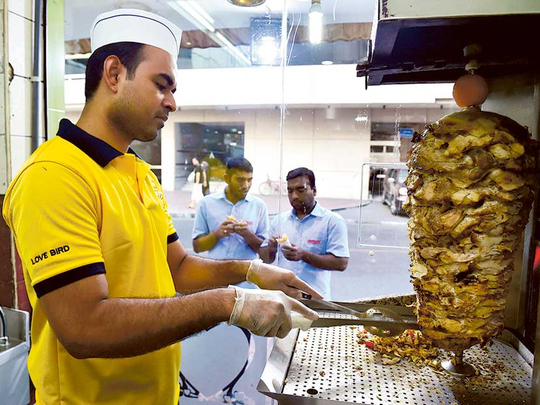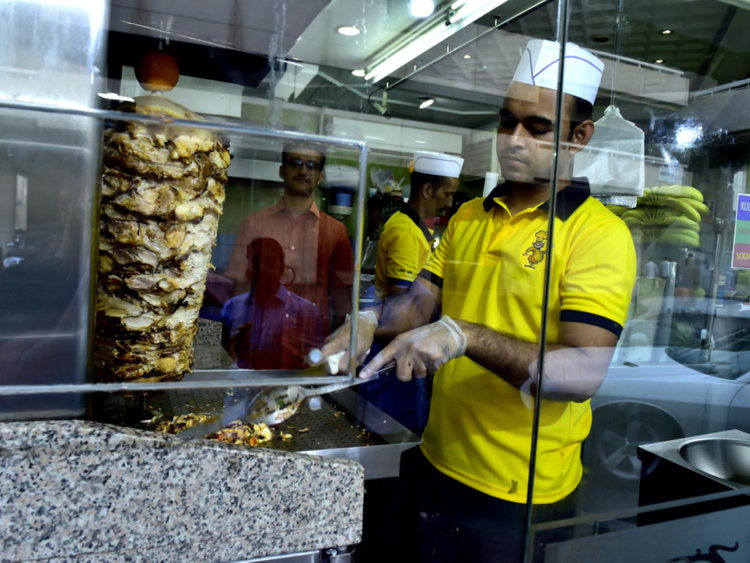
Dubai: Your favourite shawarma will not cost you more or be in short supply due to the closure of shawarma stands that did not adhere to new hygiene and safety rules, officials said.
Instead, the popular Arabic delicacy will now be safer to eat and will be cooked in better hygienic conditions, according to Dubai Municipality and outlets that have implemented new rules.
When the six-month deadline for implementing the new rules ended on October 31, as many as 113 establishments had completely stopped the activity of shawarma making and another 141 of them had not taken any action on the new requirements at all and hence will not be allowed to sell shawarmas, a senior official said last week.
These outlets accounted for 45 per cent of the 572 small and medium food outlets selling shawarma that were asked to implement the rules related to space, equipment and storage requirements aimed at enhancing hygiene and safety of the popular snack.
Of the 572, as many as 318 have either made or are in the process of making the changes to their existing conditions to comply with the guidelines. Also, there are several hundreds of larger establishments that have already been selling shawarmas by meeting all these requirements, pointed out Sultan Ali Al Taher, the head of food inspection section at the food safety department of Dubai Municipality.
Another official rebutted speculations that the new rules would create a shortage of shawarmas or lead to a hike in prices as outlets make structural changes to meet the requirements. “These are small restaurants and cafeterias which did not meet the minimum requirements. They have just complied with them now … and the cost for that is not exorbitant,” said Bobby Krishna, the principal food inspector of the municipality.
“Also the ones that were already complying [with the same rules] are selling [shawarma] for the same price. So, there is no question of these [small restaurants and cafeterias] hiking the cost for meeting the safety requirements and offering safer food to their customers,” he said.
Krishna also explained that those joints that stopped their shawarma sale will still be allowed to reopen if they meet the new requirements. “Only those joints that do not follow the regulations will be stopped from selling shawarmas.”
Gulf News spoke to a number of shawarma joints that have made the changes to meet the new requirements and all of them said they have not hiked the price of shawarma nor have plans to do so due to the new changes.
Mohammed Ali, manager of Janatha Restaurant in Al Rigga, said: “We have closed the shawarma stand and fixed an ac, a hand wash station, and refrigerator just for that. We spent some Dh12,000 for all the changes … but we don’t feel any need to pass it on to our customers. In fact the shop itself looks neater now and our service has also become much better. And as you know it’s better to follow the rules than stop the business or get fined.”
Mohammad Shabu, who owns Love Bird Cafeteria in Karama, echoed the same. “Ours is one of the smallest cafeterias in Dubai and we had a lot of space constraints. But, the municipality’s new rules and advice have helped us manage the space in a much better way.”
Though he felt that the liveliness of the outdoor shawarma sale will be gone, he welcomed the requirement of pushing it indoors to offer better safety and satisfaction for customers. “Our customers are not high income people. So, it is not a good idea for us to increase the price of shawarma,” Shabu said.
Al Ameer Cafeteria in Al Jafiliya, like the other two outlets, continues to sell shawarma for Dh5 even after implementing the regulations, a staffer said. My Sandwich Cafeteria in Silicon Oasis also confirmed that it has not changed the price of shawarma from Dh7, for which it had been selling it prior to making the necessary changes to meet the new requirements.
Mixed reactions
The news about the stoppage of shawarma sale in over 250 outlets in Dubai received mixed reactions from residents.
While many people welcomed the regulations for improving health and safety, some others raised concerns about missing shawarma outlets in some pockets of Dubai.
I. Tanvir, who works in a multinational fast food outlet, welcomed the move saying it will improve hygiene in small shawarma stands. He said he was disgusted to see a profusely sweating man preparing shawarma in an outlet in Al Rigga without using gloves. “He didn’t use any hairnet also. I felt it was all very unhygienic.”
Giving a thumbs-up to the new rule, our reader Kristiina Mayra posted on Facebook: “We used to joke that the salty taste came from sweat!”
Cynthia Risa Joseph, an Indian expat living in Karama, said: “This is the need of the hour … I feel the municipality needs to do even more.”
She said she was a huge shawarma fan until a few months back she saw how a man was handling it at a cafeteria in Karama. “I was waiting for my husband in our parked car and saw this guy. He wore gloves … but it looked as if he wore them to protect his own hands. He was opening the doors, touching his clothes and walking around everywhere wearing the same gloves with which he kept making shawarmas. I stopped eating shawarma after that,”
However many readers responded with crying and heart-broken emojis.
Mohammad Aatif even went on to comment: “This is the end of the world as we know it.”
Some people also felt that moving the shawarma stands indoors alone may not assure better food safety.
“How about outdoor BBQ? Or restaurants dining and serving outdoor? Are they meeting hygiene standards, not exposing by dust, germs or machinery pollution nearby?” asked Yousuf Saleh, a health, safety and environment professional.
However, officials said that the municipality’s regulations are not just limited to moving the shawarma stands indoors and mandating comfortable space and hygiene rules for those who prepare them.
They cover a host of measures to ensure proper refrigeration of raw materials, enough space for the storage of shawarma-making tools, separate facilities for defrosting frozen meat, thorough cleansing of vegetables and proper ways of waste disposal. Using a filter to trap the juice dipping from the rotating skewer is another measure implemented to avoid contamination and food poisoning.
History
Historically, shawarmas travelled from Turkey, where they are still known as “doner kebabs,” or “turning kebabs”. The word “shawarma” also has Turkish origins, as another name for the wrap in Turkey is “cevirme”, which literally means “turning”.
In Turkey, these rolls were made using minced meat. As the sandwich travelled across the Arab world, minced meat was replaced with thin shavings of meat — chicken, lamb or beef, sometimes even camel.
“Since the shawarma came to countries like Syria and Lebanon, it had many changes made to it like the type and quality of meat that is used,” a food industry expert told Gulf News in 2011.
Word in Dictionary
The shawarma has arrived as one of 100 new words added to the latest edition of the Merriam-Webster’s Collegiate Dictionary.
Source: Gulf News Archive





